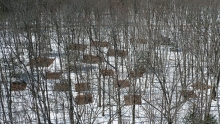You are here
Study: Warmer Forest Soils Release More Carbon, Accelerating Future Warming

A new study in the journal Science reports on 26 years of data from the world’s longest-running forest soil warming experiment, based at the Harvard Forest since 1991. It suggests that in a warming world, a self-reinforcing and perhaps uncontrollable carbon feedback will occur between forest soils and the climate system, adding to the build-up of atmospheric carbon dioxide caused by burning fossil fuels, and ultimately accelerating global warming.
Each year, fossil fuel burning releases about 10 billion metric tons of carbon into the atmosphere. Helping to offset this are the astonishing 3,500 billion metric tons of carbon stored in the world's soils. "If a significant amount of that soil carbon is added to the atmosphere," says Jerry Melillo, lead author of the study, "due to microbial activity in warmer soils, that will accelerate the global warming process. And once this self-reinforcing feedback begins, there is no easy way to turn it off."
The study points to the importance of long-term research, which at Harvard Forest is funded by the National Science Foundation's Long-Term Ecological Research Program. In the 26 years that the study has been running, the soil microbial community has fundamentally shifted several times in response to experimental soil warming, resulting in major fluxes in carbon release from soils.
Collaborators in this study include Serita Frey, Stuart Grandy, and Mel Knorr from the University of New Hampshire; Kristen DeAngelis and Grace Pold of the University of Massachusetts-Amherst; Will Werner and Michael Bernard of the Marine Biological Laboratory; and Frank Bowles of Research Designs in Lyme, NH.
- Read the full paper in Science: Long-term pattern and magnitude of soil carbon feedback to the climate system in a warming world
- Read the press release by the Marine Biological Laboratory
- Browse media features in PRI's Living on Earth, The Guardian, Inside Climate News, and International Business Times
- Learn more about Long-Term Ecological Research at Harvard Forest
(Photo of the Harvard Forest soil warming plots by Audrey Barker Plotkin)

